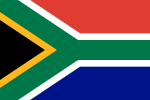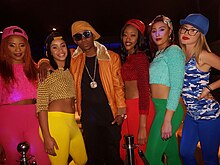Motswako
| Motswako | |
|---|---|
| Stylistic origins | |
| Cultural origins | Mid 1990s, Mafikeng, South Africa |
| Typical instruments | |
| Other topics | |
Motswako is a subgenre of hip hop originating from South Africa additionally prominently popularized in Botswana. Mafikeng, the genre's origin point, is located close to the border of Botswana, where Setswana (Tswana) is predominantly spoken similar to Mafikeng. Motswako blends rap lyrics in local languages like Setswana with English over a steady beat. It also incorporates languages such as Sesotho, Zulu and Afrikaans depending on the artist's background. Popularized by South African acts like HHP and Baphixile (comprising "Prof" and "Blax Myth") in the late nineties, it gained a significant following among local audiences. Many emerging artists in South Africa use motswako as a foundation for their music careers due to its accessible principles, emphasizing creative writing skills crucial for mastering the genre. South Africa and Botswana boast a substantial pool of motswako artists, although female representation remains limited.[1][2][3]

Title and traits
| Part of a series on the |
| Culture of South Africa |
|---|
 |
| People |
| Cuisine |
| Religion |
| Art |
| Sport |
The genre's name originates from Setswana translating to "blend", "fusion" or simply, "mix" and in context this word refers to the amalgamation of English alongside Setswana or other indigenous languages in the production of motswako.[2][4]
The musical characteristics of motswako typically encompass smooth yet laid-back rap delivery, a consistent beat, occasionally employing a four-on-the-floor rhythm and incorporating reggae-influenced Afro-centric or drum and bass beats. Minimalistic electronic elements serve to maintain a backdrop for the rap vocals to take center stage. In its early stages, motswako utilized rap lyrics primarily in Setswana alongside American vernacular. Additionally, other South African languages such as Zulu, Xhosa and Afrikaans were incorporated. Lyrical themes range from spoken word poetry performed without accompaniment to localized socio-political or economic commentary, drug culture, unity, pride in local culture, romance, objectification of women, pursuit of wealth, aspirations and celebration.[3]
History
Early years - 1990s
Setswana-based hip hop traces its origins back to the early 1990s. Stoan Seate was at the forefront of developing the musical style. Beginning with Thandiswa Mazwai, Jah Seed and Speedy in Bongo Maffin, Stoan introduced an African hip hop perspective to the ensemble's sound. Stoan additionally incorporated a combination of traditional Tswana dance with contemporary dance moves, mirroring his blend of Tswana with poetry and rap.[5][6][7]

Hip Hop Pantsula (HHP), preferring the moniker Jabba, began his journey during his teenage years as a member of the Verbal Assassins, he fashioned himself after Notorious B.I.G., resonating with both Notorious B.I.G.'s stature and allure. Following HHP's introduction to Chicco in the late 1990s, Verbal Assasins released the album Party, which had a lukewarm reception but paved the way for the rise of HHP. Chicco told Kwanele Sosibo of Mail & Guardian following HHP's passing in 2018, "My advice was that the best thing to do is to rap in Setswana because there were very few artists back then doing it, he took my advice and then things started happening for him."[1]
Cashless Society, a commercially successful motswako group, emerged in 1996 with members from Johannesburg and Gaborone. The ensemble was distinctive for rapping in American vernacular rather than Setswana.[3]
2000s - present day


Since the 2000s, South Africa has witnessed the rise of several notable acts, including Tuks Senganga, Cassper Nyovest, Spoek Mathambo, Khuli Chana, and Mo'Molemi. More recent additions to the motswako rap scene include Zeus, DJ Rade, Dramaboi, Apollo Diablo and Stagga, who hails from London and has Tswana and Jamaican heritage. Moreover in the 2000s, there was a surge in female motswako artists such as Punah, who blends motswako with jazz and gospel elements. Fifi Cooper, initially an R&B singer, transitioned into one of the most prominent female motswako rappers of her era.[3] In 2019, TV presenter turned rapper Boity Thulo commonly recognized as Boity, released single, "Bakae". Boity described the song as "motswako trap".[8][9]
See also
References
- ^ a b Sosibo, Kwanele (26 October 2018). "HHP – the motswako legend who was one of a kind". Mail & Guardian. Archived from the original on 7 November 2018. Retrieved 23 April 2024.
- ^ a b Matheolane, Mpho Moshe (15 May 2013). "The return of Prof Sobukwe". Mail & Guardian. Archived from the original on 29 November 2016. Retrieved 23 April 2024.
- ^ a b c d Goldsmith, Melissa Dawn Ursula; Fonseca, Anthony J. (2018). Hip Hop Around the World An Encyclopedia (1st ed.). ABC-CLIO. p. 489. ISBN 9780313357596.
- ^ Marshall, Rhode (14 December 2022). "Maftown rapper explores his roots". Mail & Guardian. Archived from the original on 23 December 2012. Retrieved 24 April 2024.
- ^ Kriger, Themba (28 June 2017). "A Brief History of: SA Hip Hop". Redbull. Archived from the original on 18 May 2021. Retrieved 24 April 2024.
- ^ "Motswako master Stoan back in the mix". IOL. 6 November 2023. Archived from the original on 24 April 2024. Retrieved 24 April 2024.
- ^ "The Motswako mysteries". IOL. 2 March 2006. Archived from the original on 25 April 2024. Retrieved 25 April 2024.
- ^ Langa, Phumlani S. "Is Boity's Bakae a banger?". City Press. Archived from the original on 2024-05-17. Retrieved 2024-05-17.
- ^ "Boity on new single: All I ever wanted was to work with HHP, this is for me". TimesLIVE. Archived from the original on 2024-05-17. Retrieved 2024-05-17.
